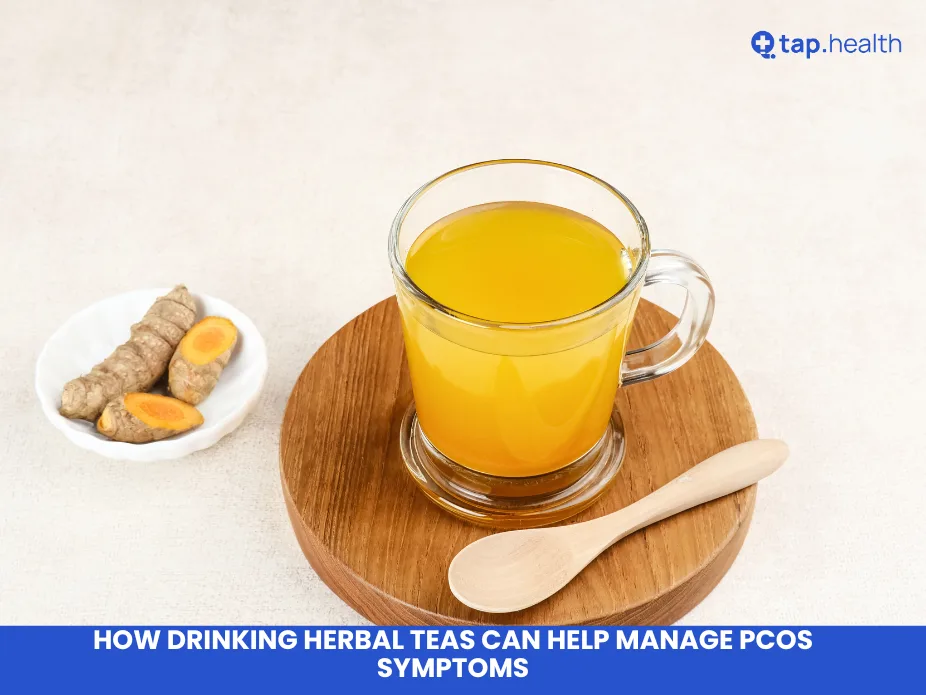Polycystic ovary syndrome (PCOS) is a common condition that affects women’s hormonal health, leading to symptoms like irregular periods, excess hair growth, and acne. While traditional treatments can be effective, many people are turning to natural remedies like herbal teas to help manage their PCOS symptoms. This article will explore how herbal teas can be a simple yet powerful addition to your wellness routine, backed by scientific research and expert recommendations.
What is PCOS and Why Should We Care?
PCOS is a hormonal disorder that affects one in ten women of childbearing age. The condition can lead to irregular periods, ovulation issues, and elevated androgen levels, which may cause symptoms like excess facial or body hair, acne, and weight gain. The exact cause of PCOS is not fully understood, but factors like genetics, inflammation, and insulin resistance play a role.
For many women, managing PCOS symptoms requires a holistic approach that combines lifestyle changes, diet, and sometimes medication. Herbal teas can provide a gentle yet effective way to manage symptoms naturally.
How Can Herbal Teas Help Manage PCOS Symptoms?
Herbal teas have been used for centuries as natural remedies for a variety of health issues. In the case of PCOS, certain herbs are believed to help balance hormones, reduce inflammation, and improve insulin sensitivity. While herbal teas shouldn’t replace medical treatment, they can complement other therapies and support overall health.
1. Reducing Inflammation with Herbal Teas
Inflammation is often linked to PCOS. Women with this condition tend to have higher levels of inflammation in the body, which can worsen symptoms. Several herbal teas contain anti-inflammatory compounds that may help reduce this chronic inflammation.
Turmeric Tea: Known for its powerful anti-inflammatory properties, turmeric contains curcumin, which has been shown to lower inflammation and may help with insulin resistance in PCOS patients.
Ginger Tea: Ginger also has natural anti-inflammatory effects. Some studies suggest that ginger can improve insulin sensitivity and help regulate blood sugar levels, both of which are critical for managing PCOS.
2. Balancing Hormones with Herbal Teas
Hormonal imbalance is one of the primary causes of PCOS symptoms. Many herbal teas contain compounds that may help regulate hormones and alleviate symptoms like acne and hair growth.
Spearmint Tea: This refreshing tea is well-known for its ability to lower androgen levels. Elevated androgen levels are responsible for symptoms like excess hair growth (hirsutism). Drinking spearmint tea twice a day has been shown to reduce male-pattern hair growth in women with PCOS.
Chaste Tree Berry Tea (Vitex): Chaste tree berry is a powerful herb that can help balance hormones by stimulating the production of progesterone and reducing excess estrogen. This can help regulate menstrual cycles and improve fertility in women with PCOS.
3. Supporting Insulin Sensitivity with Herbal Teas
Insulin resistance is a common issue for women with PCOS. When the body becomes resistant to insulin, it may lead to weight gain, increased androgen production, and other health issues. Certain herbal teas may help improve insulin sensitivity, making it easier for the body to process glucose.
Cinnamon Tea: Cinnamon is known for its ability to improve insulin sensitivity. Research shows that cinnamon can help lower blood sugar levels and improve overall metabolic function. Drinking cinnamon tea regularly may support better insulin regulation in women with PCOS.
Fenugreek Tea: Fenugreek is another herb that may help improve insulin sensitivity. Some studies suggest that fenugreek seeds can lower blood sugar levels, making them a good choice for women dealing with insulin resistance due to PCOS.
Real-life Scenarios
Scenario 1: Sarah’s Story
Sarah, a 32-year-old woman with PCOS, struggled with irregular periods and acne for years. After hearing about the benefits of herbal teas, she decided to incorporate spearmint tea into her routine. Within three months, Sarah noticed a significant reduction in acne and an improvement in her skin’s overall texture. She also reported fewer breakouts and smoother skin, thanks to the hormonal balancing effects of spearmint.
Scenario 2: Maria’s Journey with Insulin Resistance
Maria, a 28-year-old woman with PCOS, had been struggling with weight gain and fatigue due to insulin resistance. After consulting with her doctor, she started drinking cinnamon tea daily, alongside making dietary changes. Over time, Maria noticed her blood sugar levels stabilized, and she had more energy throughout the day. This combination of cinnamon tea and a balanced diet helped Maria feel more in control of her symptoms.
Read this – Managing PCOS with a Balanced Diet: How to Control Symptoms Naturally
Expert Contributions
Expert Contributions
Dr. Dixa Bhavsar, an Ayurvedic expert, highlights the effectiveness of herbal teas in managing PCOS symptoms. She recommends spearmint tea for its anti-androgenic effects, which can help reduce testosterone levels in women with PCOS. Hindustan Times
Proven Recommendations for Managing PCOS
If you’re considering adding herbal teas to your PCOS management plan, here are some proven recommendations to get the most benefit:
- Start Slow: Begin with one cup of herbal tea per day and observe how your body reacts.
- Consistency is Key: Herbal teas work best when consumed regularly. Aim for 2–3 cups a day for optimal results.
- Combine with Lifestyle Changes: Eating a balanced diet, staying active, and managing stress are crucial to managing PCOS effectively.
- Consult Your Doctor: Always check with your healthcare provider before trying new herbal remedies, especially if you have any underlying health conditions or take medications.
Factual and Reliable Information
It’s important to note that while herbal teas can be a great addition to a PCOS management routine, they are not a substitute for medical treatment. The benefits of these teas are often based on preliminary studies, and more research is needed to fully understand their effectiveness for managing PCOS. That said, many women find herbal teas to be a helpful part of their holistic health approach.
Summary of Key Herbal Teas for PCOS
| Herbal Tea | Potential Benefits for PCOS | Key Compounds/Properties |
|---|---|---|
| Spearmint Tea | Reduces hirsutism (excess hair growth) | Anti-androgenic properties |
| Chaste Tree Berry | Balances hormones, regulates menstrual cycles | Increases progesterone, reduces estrogen |
| Cinnamon Tea | Improves insulin sensitivity, lowers blood sugar | Antioxidants, improves metabolic function |
| Fenugreek Tea | Enhances insulin sensitivity, regulates blood sugar | High in soluble fiber, improves glucose metabolism |
| Ginger Tea | Reduces inflammation, supports insulin sensitivity | Anti-inflammatory compounds, antioxidants |
Frequently Asked Questions (FAQs) on How Drinking Herbal Teas Can Help Manage PCOS Symptoms
1. Can herbal teas cure PCOS?
No, herbal teas cannot cure PCOS. However, they can help manage symptoms like hormonal imbalance, insulin resistance, and inflammation.
2. How long does it take to see results from herbal teas for PCOS?
It varies, but many women report noticing improvements within 2–3 months of regular use.
3. Is spearmint tea safe for women with PCOS?
Yes, spearmint tea is generally safe for women with PCOS, especially for managing excess hair growth. However, it’s best to consult with a healthcare provider before starting.
4. Can I drink herbal teas while on PCOS medication?
Most herbal teas are safe to drink while on PCOS medication, but it’s always recommended to talk to your doctor first, especially if you’re on medication for insulin resistance or hormonal imbalances.
5. Can cinnamon tea help with weight loss in PCOS?
Cinnamon tea can help regulate blood sugar levels, which may aid in weight management, but it’s not a weight-loss solution on its own.
6. How much herbal tea should I drink daily for PCOS?
Most experts recommend drinking 2–3 cups of herbal tea per day, but always listen to your body and consult a healthcare provider for personalized advice.
Incorporating herbal teas into your PCOS management routine can be a natural and effective way to help balance hormones, reduce inflammation, and improve overall health. While they aren’t a cure, herbs like spearmint, cinnamon, and turmeric offer many benefits that complement other treatments. As always, consult with your healthcare provider before starting any new natural remedies to ensure they’re safe for your individual needs.



